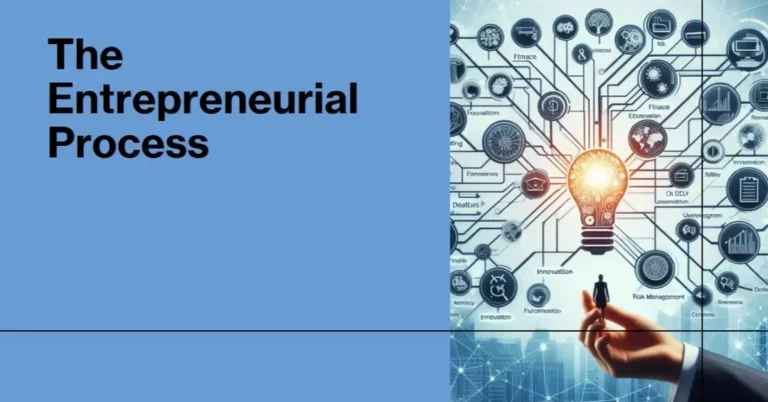
The entrepreneurial process refers to the systematic approach involved in conceiving, launching, and managing a new business venture. It encompasses a series of steps and stages that entrepreneurs undertake to transform an idea or opportunity into a successful and thriving enterprise. This process is crucial for aspiring entrepreneurs as it provides a structured framework to navigate the challenges and complexities of starting and growing a business.
The Stages of the Entrepreneurial Process
While the entrepreneurial process may vary slightly depending on the industry, product, or service, it generally involves the following key stages:
1. Idea Generation and Validation
The entrepreneurial process begins with the identification of a problem or an opportunity in the market. Entrepreneurs generate ideas through various means, such as personal experiences, market research, brainstorming sessions, or observing emerging trends. Once an idea is conceived, it must be validated to assess its feasibility, market potential, and uniqueness.
Validation can involve conducting market research, gathering feedback from potential customers, analyzing competition, and creating prototypes or minimum viable products (MVPs). This stage is crucial to determine whether the idea addresses a real need and has the potential to be a successful business venture.
2. Business Planning
After validating the idea, entrepreneurs move on to the business planning stage. This involves developing a comprehensive business plan that outlines the venture’s goals, strategies, target market, financial projections, and operational plans. The business plan serves as a roadmap for the entire entrepreneurial process, guiding decision-making and helping secure funding from investors or lenders.
During this stage, entrepreneurs also define their business model, which describes how the company will create, deliver, and capture value from its products or services. This includes identifying revenue streams, cost structures, key resources, and partnerships.

3. Resource Acquisition
Once the business plan is in place, entrepreneurs need to secure the necessary resources to bring their venture to life. This stage involves obtaining funding from various sources, such as personal savings, loans, angel investors, venture capitalists, or crowdfunding platforms. Additionally, entrepreneurs may need to acquire physical resources like office space, equipment, or inventory, as well as human resources by hiring a team or outsourcing certain functions.
4. Product Development and Launch
With the resources in place, entrepreneurs can proceed to the product development and launch stage. This involves creating and refining the product or service, ensuring it meets customer needs and adheres to industry standards and regulations. Entrepreneurs may engage in prototyping, testing, and iterating based on customer feedback to improve the offering.
Once the product or service is ready, entrepreneurs develop a marketing and sales strategy and launch their venture into the market. This stage requires effective promotion, branding, and customer acquisition efforts to create awareness and generate demand.
5. Growth and Scaling
After a successful launch, entrepreneurs focus on growing and scaling their business. This involves expanding into new markets, diversifying product or service offerings, increasing production capacity, and optimizing operations for efficiency and profitability.
During this stage, entrepreneurs may seek additional funding, form strategic partnerships, or consider mergers and acquisitions to fuel growth. Continuous innovation, adaptation to market changes, and effective management of resources are essential for sustaining the venture’s success and long-term viability.
6. Exit Strategy
Ultimately, entrepreneurs may consider an exit strategy, which involves transitioning ownership or control of the business. This could involve selling the company to another entity, going public through an initial public offering (IPO), or passing the business on to the next generation of leadership.
The entrepreneurial process is iterative and dynamic, often requiring entrepreneurs to revisit and refine certain stages as they navigate challenges, seize opportunities, and adapt to changing market conditions.

The Importance of the Entrepreneurial Process
The entrepreneurial process is crucial for several reasons:
1. **Structured Approach**: It provides a systematic and organized approach to starting and managing a business, reducing the risk of overlooking critical aspects and increasing the chances of success.
2. **Resource Allocation**: By following the entrepreneurial process, entrepreneurs can allocate resources effectively, maximizing their chances of achieving desired outcomes while minimizing waste.
3. **Risk Mitigation**: The process helps entrepreneurs identify and mitigate potential risks and challenges, enabling them to make informed decisions and develop contingency plans.
4. **Stakeholder Alignment**: The entrepreneurial process ensures that all stakeholders, including investors, partners, and employees, are aligned with the venture’s vision, goals, and strategies.
5. **Continuous Improvement**: The iterative nature of the process allows entrepreneurs to adapt and refine their strategies based on market feedback, customer needs, and changing business environments.
6. **Scalability**: By following a structured process, entrepreneurs can position their ventures for scalability, enabling them to capitalize on growth opportunities and achieve long-term sustainability.
In summary, the entrepreneurial process is a comprehensive and systematic approach that guides entrepreneurs through the various stages of conceiving, launching, and managing a successful business venture. By following this process, entrepreneurs can increase their chances of success, mitigate risks, and position their ventures for growth and long-term sustainability.
Related Contents
Things Entrepreneurs Need to Know
What must an entrepreneur assume when starting a business?
Resource
https://www.forbes.com/sites/jodiecook/2022/11/11/the-four-key-stages-of-the-entrepreneur-journey




